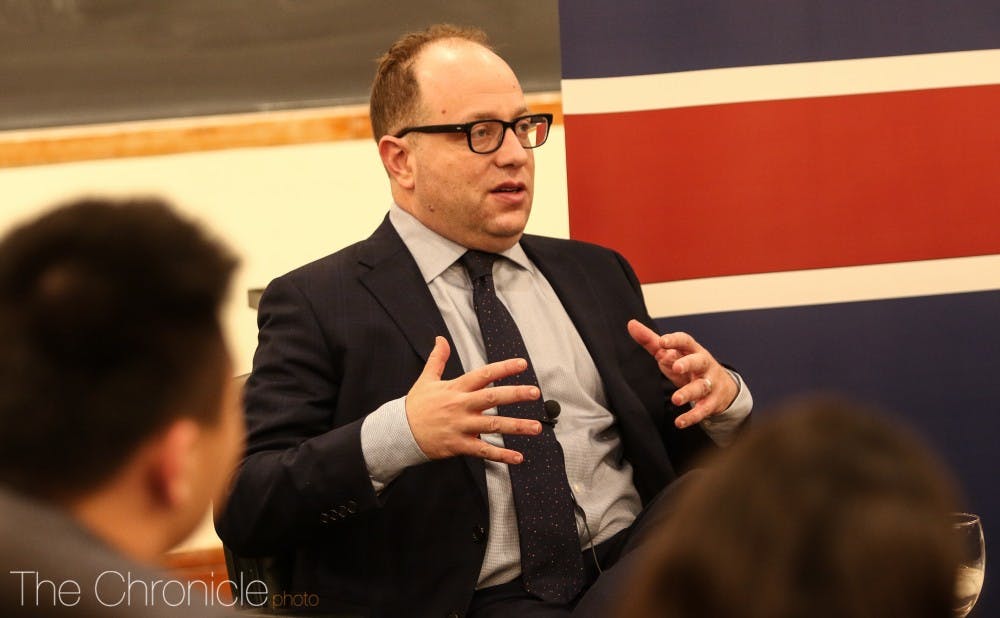The Cold War with the Soviet Union ended almost 30 years ago. According to one expert, however, we are now in the midst of another cold war with China.
Dan Blumenthal spoke at Duke Tuesday as part of the American Grand Strategy Speaker Series. Blumenthal, director of Asian Studies at the American Enterprise Institute, spoke about how America should approach foreign policy in Asia, especially with regard to China. He argued that China is the greatest foreign threat facing the United States today, and the country needs to leverage its allies in the region and around the world to combat Chinese aggression.
"What's changed more is a direct confrontational approach with China on trade issues and, frankly, it's probably the most popular thing across party lines that President Trump has done, and there's an amazing amount of support behind it," Blumenthal said, referencing America's recent approach to China, including Trump's trade war with the country.
"That's the real difference right now, is to say that China's grown too big, too strong, too predatory and we're not just going to work around the margins with them," he said. "We're going to directly confront them on these issues."
In 2012, Blumenthal explained, current Chinese President Xi Jinping took power after a succession "crisis" that followed the 2008 global recession. He described how Xi has centralized power since, purging his political enemies, expanding China's technological prowess and pursuing an aggressive foreign policy agenda.
The United States had been heavily active in Southeast Asia since World War II, because each succeeding president believed the region was too dynamic to stay away from. However, Blumenthal said that America had underestimated China’s threat level. Americans believed that if the United States cooperated with China economically, then the interdependence between the two nations would mitigate any aggression. Blumenthal argued that American politicians were wrong—he accused China of hacking, stealing intellectual property and growing its military.
"I think the competition with China will make the Cold War pale in its complexity," he said.
Blumenthal stressed that, like the space race 50 years ago with the Soviet Union, the United States is in a technology race with China in areas like artificial intelligence and 5G capability. He said America needs to reboot its “science and industrial complex” to prepare for 21st century technology priorities.
The day before he came to speak at Duke, Blumenthal published an opinion piece in the New York Times with fellow American Enterprise Institute scholar Derek Scissors titled "China is a Dangerous Rival, and America Should Treat it Like One." They wrote that the United States should "begin cutting some of its economic ties with China" to stop it from stealing America's intellectual property, bending traditional rules of global markets and building up their military capabilities.
The two advocated for not doing business with and leveling sanctions against Chinese companies "receiving stolen or coerced intellectual property" or facing accusations of human rights abuses. Cutting off a swath of Chinese imports and exports would harm their economy more than America's, they believe.
Blumenthal noted in his talk that many other countries in the region, such as Australia and Japan, are pro-American and willing to prevent China’s ascension to the world’s leading technological power. Nevertheless, China has proven to be aggressive when challenged, such as when it detained Canadian citizens, so Blumenthal said that America has to guarantee its support.
"Japan is with America as seeing China as the top political foe of the 21st century," he said. "If you're going to poke a bully, you better be sure the stronger guy will come as well.”
Get The Chronicle straight to your inbox
Signup for our weekly newsletter. Cancel at any time.

Jake Satisky is a Trinity senior and the digital strategy director for Volume 116. He was the Editor-in-Chief for Volume 115 of The Chronicle.

